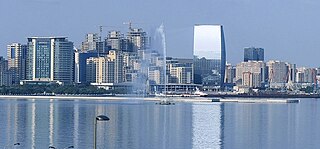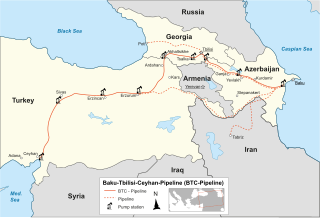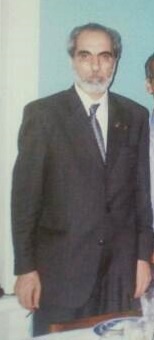Related Research Articles

Azerbaijan, officially the Republic of Azerbaijan, is a transcontinental country located at the boundary of Eastern Europe and West Asia. It is a part of the South Caucasus region and is bounded by the Caspian Sea to the east, Russia's republic of Dagestan to the north, Georgia to the northwest, Armenia and Turkey to the west, and Iran to the south. Baku is the capital and largest city.

The economy of Azerbaijan is highly dependent on oil and gas exports, in particular since the completion of the Baku-Tbilisi-Ceyhan Pipeline. The transition to oil production in the late 1990s led to rapid economic growth over the period 1995–2014. Since 2014, GDP growth has slowed down substantially.

The Baku–Tbilisi–Ceyhan (BTC) pipeline is a 1,768 kilometres (1,099 mi) long crude oil pipeline from the Azeri–Chirag–Gunashli oil field in the Caspian Sea to the Mediterranean Sea. It connects Baku, the capital of Azerbaijan and Ceyhan, a port on the south-eastern Mediterranean coast of Turkey, via Tbilisi, the capital of Georgia. It is the second-longest oil pipeline in the former Soviet Union, after the Druzhba pipeline. The first oil that was pumped from the Baku end of the pipeline reached Ceyhan on 28 May 2006.

Heydar Alirza oghlu Aliyev was an Azerbaijani politician who was a Soviet party boss in the Azerbaijan Soviet Socialist Republic from 1969 to 1982, and the third president of Azerbaijan from October 1993 to October 2003.

Abulfaz Gadirgulu oghlu Aliyev, better known as Abulfaz Elchibey, was an Azerbaijani politician, Azerbaijani nationalist and Soviet dissident who was the first and only democratically elected President in post-Soviet Azerbaijan. He was the leader of the Azerbaijani Popular Front and played an important role in achieving Azerbaijan's independence from the Soviet Union.

Islam is the majority religion in Azerbaijan, but the country is considered to be the most secular in the Muslim world. Various reports have estimated 97.3% or 99.2% of the population identifying as Muslim; with the majority being adherents of the Shia branch (55-65%), while a significant minority (35-45%) are Sunnis. Traditionally, the differences between these two branches of Islam have not been sharply defined in Azerbaijan.

The Nagorno-Karabakh conflict was an ethnic and territorial conflict between Armenia and Azerbaijan over the region of Nagorno-Karabakh, inhabited mostly by ethnic Armenians until 2023, and seven surrounding districts, inhabited mostly by Azerbaijanis until their expulsion during the 1990s. The Nagorno-Karabakh region was entirely claimed by and partially controlled by the breakaway Republic of Artsakh, but was recognized internationally as part of Azerbaijan. Azerbaijan gradually re-established control over Nagorno-Karabakh region and the seven surrounding districts.
Stephen Frederick Starr is an American expert on Russian and Eurasian affairs, a musician, and a former president of Oberlin College.

The South Caucasus Pipeline is a natural gas pipeline from the Shah Deniz gas field in the Azerbaijan sector of the Caspian Sea to Turkey. It runs parallel to the Baku–Tbilisi–Ceyhan pipeline (oil).
Thomas Goltz was an American author and journalist best known for his accounts of conflict in the Caucasus region during the 1990s. He spent 15 years in and around Turkey and the Caucasus.
Brenda Shaffer is an American scholar who holds positions as Fellow with the Atlantic Council and professor at University of Haifa. Shaffer was the former research director of the Caspian Studies Program at Harvard Kennedy School and past president of the Foreign Policy Section of the American Political Science Association. She specializes on energy in international relations and energy policy in the Caspian region and has written or edited several books of these topics, including "Energy Politics" and "Beyond the Resource Curse." Shaffer has also written a number of books on the topic of identity and culture in the Caucasus including explorations of Azeri literature and culture. She has been accused of lobbying for Azerbaijan and failing to disclose conflicts of interest. According to the 2019 book Lobbying in the European Union: Strategies, Dynamics and Trends, published by Springer: "research shows that her [Shaffer's] entire career has benefitted from financial support from sources tied to Azerbaijan's leadership".

Official diplomatic relations between the Republic of Azerbaijan and the Islamic Republic of Iran were established following the dissolution of the Soviet Union (1991). Iran and Azerbaijan share, to a large extent, the same history, religion, and culture. The territory of what is now called the Republic of Azerbaijan was separated from Iran in the first half of the 19th century, through the Russo-Persian Wars. In the area to the North of the river Aras, the territory of the contemporary Republic of Azerbaijan was controlled by Iran until it was occupied by Russia. Iran and Azerbaijan are both majority Shia Muslim nations. They have respectively the highest and second highest Shia population percentage in the world, as well as the history of Shi'ism which is rooted in both nations from exactly the same moment in history, whereas the majority of the population of both their neighboring nations are either predominantly Christians or Sunni Muslims. However, there are some tensions between the two countries as its political alignment may vary by degree. The Republic of Azerbaijan has become increasingly pro-Western aligned, and is an ally of Israel, Turkey and the United States while the Islamic Republic of Iran is largely pro-Russian and pro-Chinese aligned due to its hostility towards the U.S. and has been targeted with sanctions. Iranian politicians, like Mohammad Hosseini, have called Azerbaijan an Israeli proxy.

The Baku–Tbilisi–Kars (BTK), or Baku–Tbilisi–Akhalkalaki–Kars railway (BTAK), is a railway connecting Azerbaijan, Georgia and Turkey, which became operational on 30 October 2017 following several years of delays. The project was originally due to be completed by 2010, but was delayed to 2013, 2015, 2016, and, following a fifth trilateral meeting in February 2016, foreign ministers of the three countries announced that the railway would finally be completed in 2017.

Russia and Azerbaijan are de facto and de jure allies in many different aspects, including military. Bilateral relations exist between the Republic of Azerbaijan and the Russian Federation. The Embassy of Azerbaijan is located in Moscow, Russia. The Embassy of Russia is located in Baku, Azerbaijan.

The Baku–Novorossiysk pipeline is an 1,330-kilometre (830 mi) long oil pipeline, which runs from the Sangachal Terminal near Baku to the Novorossiysk terminal at the Black Sea coast in Russia. The Azerbaijani section of the pipeline is operated by the State Oil Company of Azerbaijan Republic (SOCAR) and the Russian section is operated by Transneft.

Armenians in Samtskhe–Javakheti are ethnic Armenians of Georgian nationality living in the Samtskhe–Javakheti region of the Republic of Georgia. The southern part of the region (Javakheti) borders Armenia to the south. Here, ethnic Armenians form the great majority of the population with minorities of Georgians, Russians and Caucasus Greeks. Among Armenians of Samtskhe–Javakheti, Armenian is the common language spoken.
The Central Asia-Caucasus Institute or CACI was founded in 1996 by S. Frederick Starr, a research professor at Johns Hopkins University's School of Advanced International Studies. He has served as vice president of Tulane University and as president of Oberlin College (1983–1994) and the Aspen Institute. He has advised three U.S. presidents on Russian/Eurasian affairs and chaired an external advisory panel on U.S. government-sponsored research on the region, organized and co-authored the first strategic assessment of Central Asia, the Caucasus and Afghanistan for the Joint Chiefs of Staff in 1999, and was involved in the drafting of recent U.S. legislation affecting the region.
The anti-Azerbaijani sentiment, or anti-Azerbaijanism has been mainly rooted in several countries, most notably in Russia, Armenia and Iran, where anti-Azerbaijani sentiment has sometimes led to violent ethnic incidents.

Corruption in Azerbaijan is considered high and occurs at all levels of government. Corruption during the Soviet era was rife and persists into the present.

The relationship between Azerbaijan and NATO started in 1992 when Azerbaijan joined the newly created North Atlantic Cooperation Council. Considerable partnership between NATO and Azerbaijan dates back to 1994, when the latter joined Partnership for Peace program. Azerbaijan established a diplomatic Mission to NATO in 1997 by the Presidential Decree on 21 November.
References
- 1 2 3 4 "Chef för UD-finansierat institut kritiseras för nära kopplingar till diktatur". Dagens Nyheter (in Swedish). 18 December 2017. ISSN 1101-2447 . Retrieved 22 September 2022.
- 1 2 3 4 Canbäck, Rasmus (9 May 2022). "Svante Cornell's dealings in Azerbaijan despite funding from MFA of Sweden". Blankspot. Retrieved 9 May 2022.
- 1 2 3 4 5 Avedian, Lillian (7 June 2023). "How Azerbaijani lobbying influences American academia". Armenian Weekly . Archived from the original on 7 June 2023. Retrieved 7 June 2023.
- 1 2 3 Dr. Svante E. Cornell profile at Strategic Studies Institute, United States Army War College
- ↑ "The Baku-Ceyhan Oil Odyssey 2000". cornellcaspian.com. 2 August 2002. Retrieved 9 May 2022– via Wayback Machine.
- ↑ wgsupport. "Svante E. Cornell". Institute for Security and Development Policy. Retrieved 14 August 2022.
- ↑ "The Baku-Ceyhan Oil Odyssey 2000". cornellcaspian.com. 2 August 2002. Retrieved 9 May 2022– via Wayback Machine.
- ↑ "Book review: The Guns of August 2008" "CRIA » ?The Guns of August 2008: Russia?s War in Georgia?, edited by Svante e. Cornell and Frederick Starr". Archived from the original on 23 September 2015. Retrieved 6 July 2015.
- ↑ Cornell, Svante E. (12 August 2008). "Russia Blames the Victim". The New York Times. Retrieved 9 November 2010.
- ↑ Cornell, Svante (8 August 2008). "The war that Russia wants". The Guardian. London. Retrieved 9 November 2010.
- ↑ "Géorgie : qu'attend l'UE pour agir face à Moscou ?" . Retrieved 9 November 2010.
- ↑ "Strategic Security Dilemmas in the Caucasus and Central Asia" (PDF). Retrieved 9 November 2010.
- ↑ Migacheva, Katya; Frederick, Bryan, eds. (2018), Religion, Conflict, and Stability in the Former Soviet Union, RAND Corporation, p. xiii